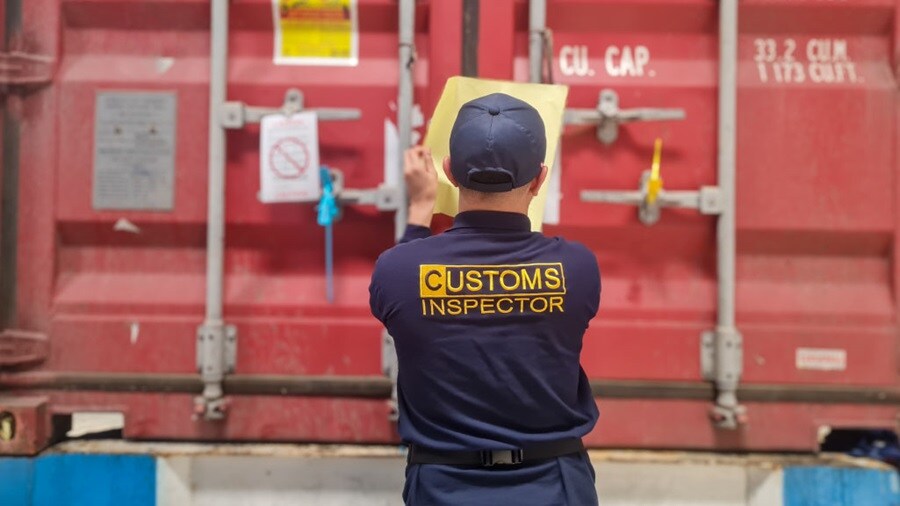In 2025, importers, exporters and their logistics partners have to contend with stricter environmental pressures, evolving trade agreements and tariff changes, and demands for more uniform customs procedures globally.
Even for logistics specialists like freight forwarders, these emerging challenges might represent a tipping point that stretches their resources too thin. The International Forwarding Association puts part of this down to a digital innovation lag, with a lack of e-booking capabilities limiting the industry’s “ability to handle high volumes of orders efficiently” and impacting “the forwarder’s responsiveness during peak demand periods”.
To mitigate these issues, Maersk enables customers to add customs to ocean bookings online. This provides freight forwarders a one-stop-shop for customs and ocean shipments, freeing up resources to focus on core revenue streams.
But that’s just the endgame, so to speak. To get more insight on what freight forwarders can do before the point of booking to streamline the process, we talked to Karin Utternas, Customs Process Administrator at Maersk. In this interview, she offers some practical advice based on her experience in the customs industry.

Preparation is critical to customs clearance
For Utternas, the most important thing is having all the right information in the documentation beforehand. “Preparation is everything,” she says. “By having all the documents prepared correctly, you can save a significant amount of time.”
This sounds simple enough. In practice, though, when freight forwarders are chasing details of the invoice, the permits, the delivery terms, the bill of lading, the power of attorney, HS codes and so on, errors and discrepancies can quickly creep into the process.
For example, a recent analysis of over 600,000 transactions showed one in three declarations to be incorrect.
Freight forwarders should therefore work with their customers to meticulously prepare the documentation and avoid any errors. In other words, that means “checking and double-checking the documents,” while Utternas also recommends freight forwarders give their customers a checklist of what to keep in mind when preparing cargo documentation, as well as preparing them for questions or with additional information in cases where cargo is held for further checks.

Stay up to date with the legislation
Freight forwarders are acutely aware of subtle variations in documentation and declaration requirements for different ports and products. But on this matter, Utternas stresses vigilance.
“It helps to know the product,” she notes, "but understanding the customs landscape is equally important.” She continues, “Customs rules are changing all the time, from one day to the next. So, you have to be up to date with what’s new, how classification codes have changed, how permits have changed and how that might affect your customers’ shipments.”
Any failure to stay updated with the regulations risks hold-ups at the ports. Here, Utternas echoes her earlier message about undertaking due diligence and being aware of rule changes and laws well in advance of committing to a delivery date and booking cargo for a shipment.
At Maersk, we’re able to support freight forwarders through our deep industry-wide customs expertise, local regulatory knowledge and global footprint of more than 2,500 customs experts. For more information on our customs services, visit this page.

Educate customers on customs risks
In addition, with the customs landscape being so fluid, Utternas believes it’s important for freight forwarders to constantly communicate risks to customers.
“Take the global trade landscape,” she observes. “How could the potential introduction of tariffs or sanctions impact the customs process?” By informing business owners about their potential impact in advance, it’s easier to manage expectations and prepare the correct documentation or to even change the supply chain route, which could mitigate the negative effects of new tariffs and sanctions.
Even at the best of times, though, risks can be daunting. To help keep everyone aligned, Utternas suggests that freight forwarders keep a “simple glossary of key terminology” used in the customs process so that business owners can understand what they are being asked to provide and why.
Be prepared to act quickly
Naturally, there will be times when even the best-laid preparations aren’t sufficient. And when the documentation isn’t correct, freight forwarders may need to act quickly to get things back on track. “When something goes wrong, many questions arise, leading to delays and increased costs,” Utternas explains.
However, she adds that this is an area where a partner like Maersk can provide real value. “At Maersk, we have so many experts in offices around the world, and because we have strong relationships with the customs authorities, we can always pick up the phone and work towards a resolution.”
Maersk can act as a strategic partner for all your customs clearance needs. And by working in this way, freight forwarders will gain a single point of contact, enabling cost savings on handover fees by combining customs with ocean bookings.

Preparation helps unlock the full potential of digital innovations
The customs landscape may be far from clear-cut. Still, one thing that is certain, at least according to Utternas, is that an unblinkered focus on accurate documentation offers the greatest likelihood of clearing the ports without any hold-ups.
Once those preparations are in place, she says, the freight forwarding industry can truly benefit from digital innovations like booking customs with your ocean shipment via Maersk.com, allowing forwarders to handle higher volumes of orders.
To see more examples of how a partnership with Maersk can benefit freight forwarders, read the infographic or visit our How To Book page for a step-by-step guide on how to add customs to your next ocean booking.
Sign up to The Logistics Pulse newsletter
You did it, welcome onboard!
We're sorry, but there was a problem sending your contact request.
Please review the form fields and ensure all required information is provided correctly. If the issue persists, please contact our support team for further assistance.
Sign up to The Logistics Pulse newsletter
Receive our insights directly in your mailbox by signing up through this form and enter a world of truly integrated logistics. Get inspired by our selection of articles that help you navigate supply chains, understand industry trends, and shape your logistics strategy. You can unsubscribe anytime.
I agree to receive logistics related news and marketing updates by email, phone, messaging services (e.g. WhatsApp) and other digital platforms, including but not limited to social media (e.g., LinkedIn) from A. P. Moller-Maersk and its affiliated companies (see latest company overview). I understand that I can opt out of such Maersk communications at any time by clicking the unsubscribe link. To see how we use your personal data, please read our Privacy Notification.
By completing this form, you confirm that you agree to the use of your personal data by Maersk as described in our Privacy Notification.













